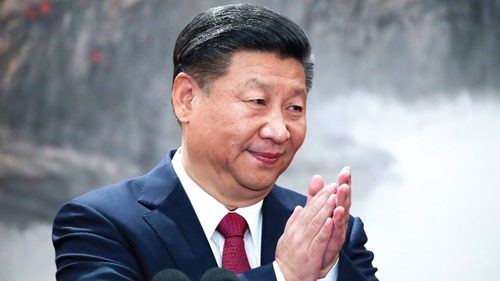Is African nations continue to navigate the complex landscape of governance, it becomes increasingly evident that fruitful models for development may lie beyond traditional Western democratic examples.
The governance approach of China, distinct in its characteristics yet effective in achieving significant economic transformation and stability, offers valuable insights for Ghana and the broader African continent.
By learning from China’s unique system, without attempting to replicate it completely, African leaders can create a framework that aligns with their distinct historical and socio-political circumstances.
This article explores seven key governance lessons that could inform Africa’s path toward sustainable development and stability.
Meritocratic leadership
A core pillar of China's governance is its unwavering commitment to meritocracy. Contrary to many African nations, where leadership often hinges on popularity contests tied to electoral cycles, China’s political system prioritises competence and experience.
Leaders are carefully selected and promoted based on their proven track record, beginning with their performance in local governance before progressing to national responsibilities.
This structured pathway could be instrumental for Ghana and other African countries in mitigating the influence of political elites.
By focusing on long-term national interest rather than short-lived electoral gains, African states can foster more responsible and accountable leadership.
Building resilient, independent institutions
China’s success can also be attributed to its robust institutional framework, which not only promotes economic growth but also enforces policy effectively.
While it is fair to acknowledge criticism regarding political freedoms, the autonomy of China’s institutions, such as the National Development and Reform Commission, is noteworthy.
These bodies are pivotal in coordinating and implementing economic policies free from excessive political interference.
Strengthening similar independent institutions in Africa, such as national development planning commissions, electoral bodies, and judicial systems, would build the capacity to uphold national development objectives, fostering a more effective governance structure.
Emphasising pragmatic economic policies and industrialisation
China’s remarkable economic progress is largely a result of its strong dedication to industrialisation and transformative economic policies.
The country has emerged as a global manufacturing powerhouse through a mix of state investment and private-sector development.
Implementing Special Economic Zones (SEZs) has proven beneficial, drawing investment, spurring technological innovation, and generating employment.
African nations, including Ghana, could implement a tailored approach by establishing SEZs focusing on their specific comparative advantages, such as agro-processing, mineral refinery and technology.
This shift from mere raw material dependence to value addition could significantly boost economic resilience and innovation across the continent.
Governance, policy continuity
Frequent governmental changes can undermine policy effectiveness, a common challenge faced by many African nations.
While Ghana's constitution advocates for the continuation of projects beyond electoral cycles, adherence to the principle often falters.
In contrast, China’s centralised system ensures that national policies are executed consistently, bolstered by a five-year planning model that facilitates the systematic achievement of long-term goals. African countries could benefit from instituting national development strategies that are legally binding and designed to transcend electoral turnover, thus safeguarding against destructive policy shifts.
Strengthening anti-corruption measures
The fight against corruption remains a significant hurdle in many African countries, and China's assertive anti-corruption initiative presents a powerful example.
Under the leadership of Xi Jinping, the Central Commission for Discipline Inspection has made strides in addressing corruption at various governmental levels.
For African leaders grappling with governance challenges caused by corruption, establishing independent and anti-corruption agencies endowed with prosecutorial authority could mitigate financial mismanagement and political misconduct.
Fostering transparency and public accountability is crucial for rebuilding trust in governance systems.
Balancing state influence with market reforms
China’s unique ability to intertwine state-led with market liberalisation has further spurred its economic dynamism.
Through the ‘dual-truck’ approach, the Chinese government has allowed private enterprises to flourish while still maintaining substantial involvement in strategic sectors such as banking, energy and infrastructure.
For Africa, which often faces pitfalls due to overreliance on foreign investment, this balanced approach could be particularly beneficial.
By asserting strategic state participation in vital industries such as mining, energy, and agriculture, African economies could retain a greater share of value while simultaneously promoting competitive market conditions.
Embracing decentralisation and local governance Decentralisation is vital for fostering local governance and ensuring that citizens have a voice in decision-making. China's structure enables local authorities to implement national policies while addressing regional and local needs effectively.
This blend of central oversight with local autonomy could be pivotal for African nations as they enhance governance structures.
By empowering local government to address community-specific challenges and mobilise resources effectively, African leaders can cultivate a democratic culture that resonates more acutely with the populace.
Conclusion
The journey towards improved governance in Africa does not require a wholesale adoption of foreign models.
Instead, by drawing critical lessons from China’s unique governance practices, African leaders can develop systems that resonate with their population and reflect their values.
By prioritising meritocratic leadership, establishing strong institutions, and fostering decentralised governance, African nations can work towards a more prosperous, stable and equitable future.
This approach not only respects the continent’s diverse realities but also lays a robust foundation for the advancement of democracy and governments across Africa.
The writer is a Political Scientist

